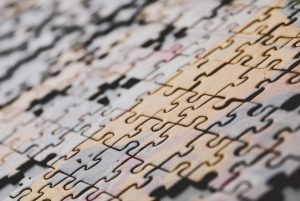Audio Version Of The Blog – 8/31/23
Listen to an Audio Version of the Blog
Download:MP3 Audio

Listen to an Audio Version of the Blog
Download:MP3 Audio
 Question: It hurts me that the Creator does not love me the way I am. It seems to me that He wants to change me, break me. How can I feel love for Him from this state?
Question: It hurts me that the Creator does not love me the way I am. It seems to me that He wants to change me, break me. How can I feel love for Him from this state?
Answer: But why should the Creator love you? Why do you demand that He love you the way you are? On the contrary, we must ask the Creator to correct us.
This is why I do not like myself the way I am now. Each time I love myself more in the form in which I want to see myself in a day, in two, and so on. So, do not get confused.
The fact that the Creator does not love us in today’s state is very good. He wants us to be corrected and thus gives us such feelings.
[316892]
From the Daily Kabbalah lesson 8/10/23, “Habit becomes A Second Nature”
Related Material:
What Should You Ask For When You Are Suffering?
A Kabbalist’s Prayer
A Request Is An Expression Of Inner Aspirations
 All pleasures have a specific image from which we receive pleasure. A person must understand precisely whether he is following them for the sake of connection with his friends and with the Creator or whether he is against these pleasures.
All pleasures have a specific image from which we receive pleasure. A person must understand precisely whether he is following them for the sake of connection with his friends and with the Creator or whether he is against these pleasures.
In order to properly receive them and thank the Creator for them without the shame of receiving them, we must try to clarify our relationship with the Creator so that all our desires, intentions, thoughts, and aspirations are directed to Him.
Question: At the moment of enjoyment, do you need to think that it gives pleasure to the Creator or should we rejoice and enjoy what He gives?
Answer: It depends on who the pleasures come from: from you to the Creator or from the Creator to you.
The task of enjoyment is that we correctly orient ourselves to the Creator; it is when you want to accept this pleasure only if you bring contentment to the Creator.
Question: And if I don’t need special pleasures, but the Creator gives them to me, what should I do?
Answer: You should receive them and be grateful; enjoy them with the Creator and with the ten. And if they distract you from connection with your friends, then you don’t use them. But in the end, absolutely all pleasures can be used for the sake of integration with the Creator.
[316903]
From the Daily Kabbalah Lesson 8/11/23, “Habit Becomes a Second Nature”
Related Material:
What Can Bring Contentment to the Creator?
Don’t Be Afraid To Receive Pleasure
Love The Lord Your God With All Your Heart
 Question: How should I relate to the pleasure from meetings of the ten?
Question: How should I relate to the pleasure from meetings of the ten?
Answer: Enjoy; just make sure you understand that you receive pleasure from the connection with the friends.
Question: What should one choose: a meeting with the ten or watching a lesson alone?
Answer: Undoubtedly, a meeting with the ten. You can listen to the recorded lesson later.
Question: Is it true that suffering and pleasure are the carrot and the stick from the Creator?
Answer: Let it be so for now. Later, you will see that both are carrots.
Question: Is efficiency in spirituality the ability to quickly rise above states?
Answer: Yes, from a descent to an ascent.
[316931]
From the Daily Kabbalah lesson 8/11/23, “Habit becomes A Second Nature”
Related Material:
Questions about Spiritual Work—10
Questions about Spiritual Work—9
Questions about Spiritual Work—8
This is why the forces of separation are called “locks,” since they block the gates of approaching and drive us away from the Creator (“Two Points,” Introduction to The Book of Zohar).
Question: What are these properties that distance us from the Creator?
Answer: Everything that we do not yet attain as the sum of all our efforts and everything that we do not yet attain as unity is manifested within us in the form of all kinds of contradictory properties and mutual rejection from each other only in order for us to understand the law of manifestation of properties and come to a state when all these properties will complement each other and not contradict each other.
Then we will reveal unity, that is, the property of the Creator, which is manifested literally in the entire creation.
[316805]
From KabTV’s “Introduction to The Book of Zohar” 8/6/23
Related Material:
Merging Of Opposites
Unity Is A New Reality
When The Gates Open…
 Question: There is something called a goal setting problem. It applies both to humans and artificial intelligence. When a person sets a goal for himself he needs to evaluate whether it is good or bad in a global sense and whether it brings him closer to something or moves him away from it.
Question: There is something called a goal setting problem. It applies both to humans and artificial intelligence. When a person sets a goal for himself he needs to evaluate whether it is good or bad in a global sense and whether it brings him closer to something or moves him away from it.
This evaluation is done on both a genetic level and on the basis of moral principles acquired from society and the laws of the state.
When artificial intelligence is being trained, a problem arises in how to evaluate its actions, because if even a single factor is not taken into account, the artificial intelligence might ignore it. Let us assume the task is to plant a field of strawberries without harming any humans. If the factor of not harming humans is ignored and not included in the overall algorithm, it will lead to significant harm. This is an intricate and complex system that is impossible to design perfectly from the start.
How can we determine what is good and what is bad? I understand that this is a higher-order problem. But still, on the basis of what can be done or at least to come closer to the conclusion that it is good and what is not?
Answer: First, if something is done for the benefit of people—not just for one individual or a single group, but for the benefit of all people—then it is considered good. Second, it is considered good if it does not cause irreparable harm to nature in the process. That is all, really.
These two rules are essentially complex, but they encompass a lot within them.
Question: Is this similar to Kabbalistic definitions where seemingly simple definitions contain the entirety of the universe or the whole path of humanity from the beginning to the ultimate goal? How do you operate with such things in practice?
Answer: Only under the condition of proper education for all the inhabitants of the planet. That is, to load the right information into a person in the course of life and work it out with him until it becomes a practical necessity and reality.
[316528]
From KabTV’s “Kabbalah Express” 7/31/23
Related Material:
Artificial Intelligence
Man And Artificial Intelligence
Artificial Intelligence And Problem Solving
 Question: I heard about a country that paid citizens $7,000 for a newborn baby, newlyweds were given $64,000 to buy an apartment, and if you opened a personal business they gave you $20,000. Education and medicine were free, there was no rent, there was no electricity fee, loans were interest free. When buying a car, 50% is paid by the state. It’s just scary to go down the list. They were certain that it was possible to live like this forever. I am talking about Libya. I look at countries like Saudi Arabia, Kuwait, Switzerland, and Belgium, and ask, is it possible to destroy such a material paradise? Here it was destroyed. Generally, can it be destroyed?
Question: I heard about a country that paid citizens $7,000 for a newborn baby, newlyweds were given $64,000 to buy an apartment, and if you opened a personal business they gave you $20,000. Education and medicine were free, there was no rent, there was no electricity fee, loans were interest free. When buying a car, 50% is paid by the state. It’s just scary to go down the list. They were certain that it was possible to live like this forever. I am talking about Libya. I look at countries like Saudi Arabia, Kuwait, Switzerland, and Belgium, and ask, is it possible to destroy such a material paradise? Here it was destroyed. Generally, can it be destroyed?
Answer: Outside or inside?
Question: It doesn’t matter whether outside or inside. A person should hold on to it with his hands and toes. This is his material world; he is completely provided for. How does it fall apart? Please explain.
Answer: People don’t appreciate what they have. And on the other hand there are many envious people—external and internal. Therefore, they destroy it.
Question: How can something enter within a person and say: “This is paradise, you have to give it up and destroy it all, and after that there will be just ruins”?
Answer: If this is an ideology, then it can be higher.
Question: So can it be done? Even in these countries that we are looking at now and are absolutely sure that they will hold on for centuries and centuries?
Answer: Not for long.
Question: When we talked about Sodom, in principle, was it the same state as in Libya and Saudi Arabia?
In Sodom, we are talking about the fact that the Creator said that it is impossible to live like this, and it must be destroyed. At what point does such impatience come from above?
Answer: When people start neglecting what is given to them.
Question: Meaning, full financial support was given. What is the neglect of a person?
Answer: In the fact that he believes that he, supposedly, is entitled to it.
Question: Should a person say: “This is not mine and I am not entitled to it”?
Answer: I am not entitled to it, but I receive it, and I am grateful to the Creator for it.
Question: Is this the main sentence?
Answer: Yes.
Question: So, this principle that was in Sodom, “mine is mine, yours is yours,” are very close to the principles in this instance?
Answer: This principle was rigidly established. That is, if my neighbor is starving, I have no right to help him.
Comment: Well, this is too much! I don’t think it’s possible right now.
My Response: This is the other side of the same coin.
Question: In principle, these states, material goods can transform into this rigid law? “Mine is mine, yours is yours,” and I don’t help you, and you don’t help me.
Answer: Yes.
Question: Is there any logic in this?
Answer: The logic is absolute. It has a lot of adherents. Let’s say that we receive everything from the Creator. If the Creator gave to you, but did not give to me, then, even if I die, I must receive from the Creator what He gives me.
Question: So, the Creator gave wealth to one, poverty to another, and that’s how it should be? And I don’t interfere with your poverty, and you don’t interfere with my wealth?
Answer: Yes.
Question: There is logic in this. So, what is the vice?
Answer: The vice is that people don’t take it as they should. Meaning, they do not accept the absolute authority of the Creator, and therefore, it is destroyed.
We must be above this strictness of the Creator. Not just “yours is yours and mine is mine.” It is given to us from above, and we have to make an adjustment to it, that it is all ours.
Given by the Creator, “yours is yours and mine is mine,” initially, we leave it within, and from above we cover it with love.
Question: Is this what is called “ours”? So we are building bridges from one to the other?
Answer: Yes.
Question: Is this the main work? Then it is for centuries and doesn’t change anymore?
Answer: Then we are like partners with the Creator. He created evil, and we build bridges over this evil with love.
Question: And the evil that He created is “mine is mine, yours is yours”? Is that what you call evil?
Answer: Of course. This is egoism.
Question: How does this differ from revolutions? In a revolution, too, they said: “This is ours.” What wasn’t there? We say, “mine is mine, yours is yours” should transform into “ours.”
Answer: There was no such ideal—”ours.” If we have to do everything, then everything is in our hands. Then, it means there is no Creator, by definition.
I think nothing good will come of all these theories. I am sure that the world will still come to the realization that it is necessary to solve these issues by the Kabbalistic method. Meaning, to put the Creator—the one, the whole—at the head of the entire process of human development and hold onto Him. And do it only in the name of a single sentence, the phrase, Brotherhood!
Question: And will people want to grab onto this? Won’t they want to lose it?
Answer: If they will want to lose it, they will plunge themselves into such a confrontation that there will be no one to be in a showdown with.
[315230]
From KabTV’s “News with Dr. Michael Laitman” 6/26/23
Related Material:
The Four States Of An Egoistic Society
Models Of Behavior In Society
Main Thing—Contact

New Life 231 – Happiness And Health
Dr. Michael Laitman in conversation with Oren Levi and Tal Mandelbaum ben Moshe
What is the connection between the physical condition of a person and his or her spiritual condition and degree of happiness? How do you define the feeling of happiness? What is considered health?
Certainly the condition of the body influences happiness, but being healthy still doesn’t make a person happy. Certainly below a particular level of health, the body constantly bothers and disturbs your happiness. However, disabled people are sometimes happier than others. It is worthwhile for a person to learn to strive for what he can achieve, and to give up what is beyond his ability.
The purpose of life is to be happy, not to be preoccupied with the body. Therefore it is necessary to be concerned that the body will not interfere. A class of disabled children play together and are very happy. When everyone is together, limitations do not interfere.
The mental health of a person very much depends on the environment. Mutual help brings happiness. In the future, we will achieve a state of good physical health, but we will be less happy. Listening to your body will also not bring real happiness; even maximal relaxation is temporary. A balance between the individual and society according to a uniform standard, like they tried in China and Russia, doesn’t bring happiness.
Happiness is the feeling of satisfaction from realizing yourself. Happiness is felt when there is something higher that you have in life, something for which you feel it is worthwhile to live. Drugs don’t bring real happiness. There is no sense in them of the reality of life, of reaching the essence of life. It is specifically in situations of extreme illness that a person has the opportunity to recognize the power that is managing his life. A person who transcends narrow egoism will discover the forces that act on us and can create balance in their life.
[134677]
From KabTV’s “New Life 231 – Happiness And Health,” 9/29/13
This summary was written and edited by students of Kabbalist Dr. Michael Laitman
 Michael Laitman, On Quora: “How do you connect with different people?“
Michael Laitman, On Quora: “How do you connect with different people?“
It is hard for us to accept different people because we have no integral perspective on the world. If we had one, then we would see how we all complement each other, and that we each have our own special roles.
We can perhaps understand this concept clearer with professions, for instance, that one person is an engineer, another is a teacher, another a cleaner, and another a doctor, and so on. Together we provide each other with services that we all need, and we are mutually dependent on each person performing their duty responsibly.
If we learn how to connect above our differences and use them to complement each other, then the greater our differences are, the stronger our connection will be.
When we can finally connect above our differences, then it is as if we piece together a complex jigsaw puzzle, and such a connection surfaces a special force of connection that dwells in nature.
What is the basis for this connection between different people?
We can connect in such a way on the basis of viewing the need for every person in this global puzzle that we have to piece correctly together. When we understand that every person is a unique piece of the puzzle, then we can support and encourage each other to find each one’s place.
In such a process, it is important to understand that we change nobody but ourselves. We cannot force people to change. Instead, we need to find our optimal relationship to one another. This is because we each have our inborn nature-made characteristics, as well as those that develop under social influences. When we eventually develop in a social environment that guides our development to connect above our differences, then we find how vital and essential our characteristics are.
Then, when we connect, it is actually our differences that create a collective, integral and complete jigsaw puzzle. Moreover, by connecting correctly, we can then truly appreciate the richness and versatility we have when we feel how vastly different we are from each other, and upon our differences we together make one integral whole.

Based on a talk with Kabbalist Dr. Michael Laitman in a radio interview on Israel’s 103FM on August 2, 2015. Written/edited by students of Kabbalist Dr. Michael Laitman.
Photo by Sigmund on Unsplash.
 Michael Laitman, On Quora: “How do I make a good future?“
Michael Laitman, On Quora: “How do I make a good future?“
To secure ourselves a good future, we need to make sure that everyone has a good future, and not that we each try to build a good future for ourselves at the expense of one another.
We need to also know how to come closer to each other in a harmonious and peaceful manner, so that everyone will enjoy safe, comfortable, happy and confident lives.
Verbally, everyone agrees to these ideas. But due to our egoistic nature, where we each desire to self-benefit at the expense of others, we cannot observe them.
We thus find two opposites in the same place. On one hand, everyone understands that they will be well-off if there will be positive connections among everyone, but on the other hand, according to our overblown egoistic nature, we each want to hold ourselves in a somewhat superior position to others.
We thus need to acknowledge that humanity’s good future depends solely on directing ourselves to achieve positive human relations, where we all treat each other favorably.

Based on the video “Is the US a Declining Global Superpower?” with Kabbalist Dr. Michael Laitman.
Written/edited by students of Kabbalist Dr. Michael Laitman.